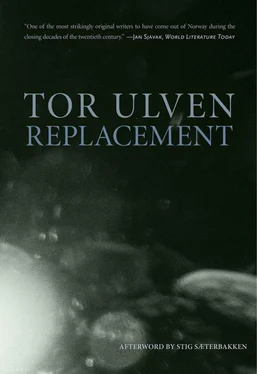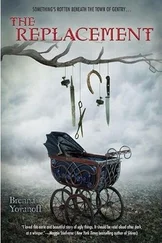Your arms are covered in white. A white shirt, which you can see to the extent that you’re able to keep your (squinting) eyes open, but you realize that it’s unbuttoned at the throat and that you’re apparently missing a tie; at least you’ve managed to keep your pants on (a brief glance confirms this), and both, or actually, one black shoe; this latter realization is made possible by the fact that the blanket, which should’ve covered you, is lying like a heap of mashed potatoes on the floor. After a moment’s hesitation (a frozen gesture), you reverse the direction of your hand, reverse the painful, unfinished gesture toward the light switch, and it feels like a metal grill has slammed into your skull, when you instead stretch your upper body toward the blanket, grab it by one end and haul it, little by little, toward you; although it feels as heavy as a bag of sawdust or sand, you finally manage to somehow pull it onto the bed and up over your body. You don’t know if today is bleak and gloomy, silent and snowy, or ice cold and clear, but nonetheless you scowl at the new morning, you despise the thought of a new winter’s day, of a new day in general, there’s no way you’re just going to let yourself be wheeled into a new day, like they’d wheel you into an operating room, where a painful and debilitating surgery is waiting. You fall sleep again.
The next time you wake up, it’s light enough to see the numbers on the alarm clock: three minutes after eight. Did you remember to go shopping? You might as well get up. Is today the day they’re launching the campaign for the new retirement accounts? You don’t remember. What you do remember are those bank employees in their bleak gray or midnight-blue suits, those dour, obsessive-compulsive, humorless, bean-counting, anal-retentive pricks, arriving at the office and clutching their coffee mugs with grave and arrogant expressions, while they stuff their faces with free pastries, only theoretically able to find even the slightest bit of humor in his proposed newspaper ads, but definitely capable of worrying about how much the campaign will cost, whether they’re being scammed, whether corners can’t be cut, whether a cheaper medium can’t be found, those puritanical penny-pinchers, those fossilized calculators, holdovers of old-school capitalism’s pray, work, and save philosophy (like the bank president’s inevitable story about his father, the man whom “waste not, want not” made rich, who’d find used nails, straighten them out, and put them in a special box for a rainy day, the same way he stuck every fucking spare shilling in the bank he’d one day be president of, feeding an account that grew, bit by bit, into a gigantic, glittering load of dough, a constipation of cash, a horde of money he could loan out to desperate farmers and broke businessmen at interest rates that amounted to highway robbery, until his account was bursting at the seams, until it had swelled to monumental proportions, until it was a golden erection pointed straight at heaven, and all the while he continued to pick up used, even rusty nails, straighten them out, and put them in a special box for a rainy day); you remember those bank employees and their mind-numbing ad campaign, and still you get up, pressing your hand to your forehead, like that’ll help, only to find it’s covered in sweat, even though you’re freezing. You use your feet to feel around for your slippers. They’re not where they should be, but then again they never are (she always managed to keep them corralled). You eventually discover them way back under your double bed, you can’t possibly reach them without half-crawling underneath, something the throbbing in your head and the stiffness in your arms makes impossible; you look for a tool of some kind and find an old-fashioned wooden hanger (the name and address of the clothes store it came from are stamped symmetrically, heraldically to both the right and the left, and you remember reading a long time ago that some animals, chimpanzees to be precise, use tools, like plant stalks or sticks, that they can poke into anthills, encouraging the ants to march up the stalk or the stick, while the ape, or rather, the chimp slowly pulls the tool out, licking off the ants and swallowing them). Although it takes a monumental effort, you finally succeed in coaxing out your slippers with the help of the hanger: they seem to have accumulated a beard or lichen-like ring of dust on their yellow, suede skin.
You remember then that you’ve already got one shoe (and one sock) on, and, therefore, you’ll have to take your shoe off before pulling (both) slippers on, but then again, you could always wear a shoe on one foot (the left) and a slipper on the other, which would probably be uncomfortable, because the shoe has a heel and the slipper doesn’t, forcing you to limp, or you could try finding the other shoe (no doubt a hopeless task). You finally decide to take the shoe off and pull the slippers on, and so you do that, careful to avoid sudden movements. When you’ve got both slippers on, you miraculously discover your robe beneath a pile of dirty clothes, which soundlessly avalanches off the chair when disturbed, and because you’re freezing, you pull the robe on over your white shirt and pants.
A pattern that repeats itself with slight variations: one last car manages to sneak by the yellow light, and the next car, arriving too late to slip by, resignedly applies its brakes (the going is slow, the roadway slick), coming to an abrupt stop and forcing the car behind it swerve a little into the bike lane, a movement more or less evenly transmitted on down the line (to which you can see no end), something that (from your bird’s-eye view) makes the line of cars resemble a lazy, segmented worm bunching up, until all the cars have come to a complete stop a few meters closer to the intersection; in the meantime, the other traffic light has turned green and the first car either gets underway smoothly or with a slight jerk (analogous to the abrupt stop made by the cross traffic), and this movement is transmitted from the first car on down the line, something that (from your bird’s-eye view) looks like a segmented worm slowly lengthening out, until one of the cars resignedly applies its brakes as the light turns from yellow to red, so that the same process begins again in the opposite direction. Slight variations in the pattern result from cars putting on blinking orange lights and then turning right or left. Seen from your window (while you’re quickly pulling on your robe and fastening its belt around your waist), the whole thing resembles an enormous cross, a cross whose arms are in constant motion, first one way, then the other, like a kinetic memorial marking the spot of a deadly crash.
Did you remember? The possibility you could’ve forgotten causes your palms to break out into tiny beads of sweat (you could inspect them, but you don’t), and you feel your pulse throbbing in the veins of your wrist, and your muscles tensing for no good reason, and you move somewhat more stiffly, but you move, you have to see for yourself, you direct your tottering steps toward the kitchen, trip over a pile of newspapers (they lose their precarious balance and slide out into a rough fan shape), though you manage to keep your balance, you pause in front of the refrigerator door before you jerk it open, causing something (bottles?) to rattle. Milk, cheese, butter, margarine, ketchup, Swiss cheese, yogurt, caviar, geitost, eggs, cucumbers, mayonnaise, sausage, orange marmalade, tuna salad, parmesan cheese, capers, cauliflower, Thousand Island dressing, cheese spread, garlic spread, chocolate syrup, even apple juice, but no bottle of beer, not so much as half a bottle of beer in sight, that can’t be possible, you begin to pull the potpourri of glasses, plastic bottles, squeeze tubes, and random packages out of the refrigerator and to set them on the counter (while you stupidly and against your better judgment think that if she were here now, she could’ve told you exactly where the beer was) to discover whether, for some unfathomable reason, the bottles might be hidden behind something else; it’s possible, but the refrigerator is empty, or rather, it’s empty of all the basic necessities, or, to put it another way, it’s full, full of everything but the one thing it should be full of.
Читать дальше












